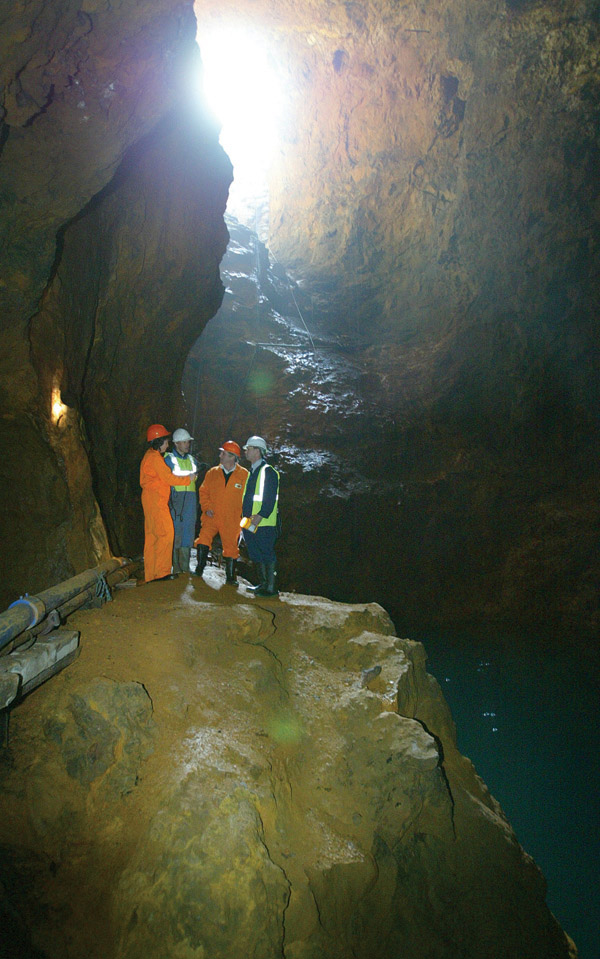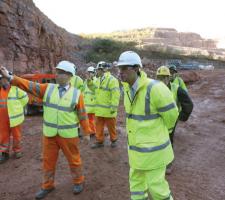
Trespassers that are killed or injured are a constant worry for quarry operators. Alan Peterson reports
While European quarry operators have worked hard to improve the safety of their employees, there is one group of site visitors that many still struggle with - trespassers. Trespass is a problem for many quarries and related operations across Europe and disused quarries pose a particular problem, primarily because they are generally not manned.
A catalogue of injuries and deaths across the region serve as a stark warning of how the attraction of quarries can easily turn to tragedy. Incidences include the recent death of a young woman in South Yorkshire, UK who was crushed to death by rock. An inquest heard that the site had no security fence or warning signs because they kept being stolen. The fencing was taken as quickly as it was replaced. Also in the UK, a teenage boy dived to his death in a disused quarry lake after local adults used vehicles to drag steel fence posts out of the ground in order to gain illegal access.
In the majority of cases, trespass is associated with leisure activities, such as dog-walking, motor-cycling and bird-watching. In some cases over recent years, fences have been cut by adults trying to steal the eggs of rare birds.
The potential for accidents in disused quarries - often considered beauty spots and attracting whole families - are a top concern. Among the adults who often ignore the hazards of such sites - and in doing so encourage children - are divers and climbers.
Play safe In a survey conducted this year by the UK's Quarry Products Association (
The survey also found that while the over-25s are the most frequent trespassers, teenage trespass is a bigger concern, particularly for those quarries near towns and cities.
The latest QPA 'Play Safe' questionnaire took in the views of quarry managers at 327 sites around the UK. Around 60% of the quarries reported problems with trespass in the last two years, with 20% saying trespass is a constant worry. Over half of the quarries expect to have trespass problems in the next 12 months.
Many sites have employed CCTV, extra security guards, new fencing and have increased co-operation with the police to try to tackle the problem.
The QPA's director of communications, Elizabeth Clements, said, "We are concerned that, despite our best efforts, there are accidents waiting to happen across the country and we are particularly alarmed that irresponsible adults are a prime cause. Companies inspect and repair fences on a regular basis, but it is almost impossible to prevent those who are determined to get in.
"Quarries may seem like good places to spend a sunny day, but deep lakes, piles of sand and loose rocks all pose risks to the unsuspecting." As a novel way to get its message across to young people, the QPA has launched a free interactive game at www.quarryrescue.com. Among other activities over recent months has been a pilot exercise involving secondary schools in key quarrying regions. Designed to find new ways of communicating the quarry safety message to teenagers, the initiative has involved asking pupils to come up with their own methods of communicating with their peers. Activities have included videos, newsletters, screen saver graphics, a website, a radio station and even a sculpture.
Surrounding the quarry on three sides is Beech Woodland which has been designated by the EU as a Special Area of Conservation (SAC). Another important part of the site is the quarry's disused underground iron workings, which are likely to have been active in the late 16th Century and may have commenced in Roman times.
Cemex's health and safety manager Peter Luxmore, said accidents at the site had being going down. "The last one to affect us was three or four years ago with a drowning in a lake. While we have a trespass problem, actual accidents are infrequent. That's not to say we don't worry every day, expecting to turn up and find that something has happened."
Luxmore said although they have walked away from inactive sites "we still have a responsibility". Water is just one concern. The caves and old iron ore workings at Taff's Well make it an attractive proposition for potholers.
"We have closed off all the mine workings, but people like challenges. We know people have been in at the weekends during a shutdown period and left evidence," he said.
Taff's Well is littered with entrances, some of which we have only just discovered. "We bought the site in 1999 and up until two years ago we had not discovered all the entrances. If somebody wants to get in, they will. There is a limit to what can be done, because of the sheer size of quarries," he explained.
A potentially bigger problem are the two public footpaths across the site that have never been deregistered. "What we do is to try and protect dangerous parts with signs and fencing and daily inspections," said Luxmore.
Companies like Cemex have the same legal requirements as the railway industry, namely that although it is impossible to prevent track access, they have a public liability. The company uses CCTV systems, but they are more aimed at reducing plant theft.
"There is no way we could cover the whole of the site with cameras because of its size and layout," said Luxmore.
"We campaign to warn people, through open days and school trips. It's a chance to educate about the industry, but also to say: 'look water may look enticing but it is dangerous."
At another Cemex quarry, Wenvoe, just north-west of Cardiff adjacent to a large council estate, the company have had youths, probably out of boredom, congregating on the edge of quarry, throwing rocks at plant and employees. Police were called and was a standoff. The incident probably had links to a local campaign to stop expansion at the site. That might have prompted an anti-quarry feeling, rubbing off onto teenagers.
Quarry trespass is clearly a serious issue and sites have a responsibility to provide warnings of potential danger areas.
Experience shows that through a proactive approach, it could be possible to educate the local communities about the dangers. But there is no one size fits all solution and quarry operators need to consider the issues on a site by site basis.










